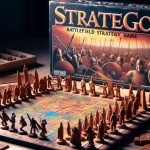Strategy board games simulate a battlefield by challenging players to think strategically, plan their moves, and outwit their opponents to achieve victory. These games transport participants into the midst of intense conflicts where every decision can have significant consequences. From ancient war simulations to modern-day strategic showdowns, these games have captured the imagination of enthusiasts around the world.
As we delve into the world of strategy board games, it becomes evident that these games have a rich history that dates back centuries. Tracing their origins reveals how they have evolved from simple dice and grid-based games to complex simulations that blend elements of warfare, diplomacy, and resource management. The evolution of these games mirrors the strategic thinking and tactical acumen required on real battlefields, making them both challenging and engaging for players.
Today, strategy board games come in various forms and categories, catering to different tastes and preferences. Whether it’s classic war games like Risk or more Euro-style titles such as Settlers of Catan, there is a game for every type of strategist. The diversity of options available ensures that players can find a game that suits their interests while providing an immersive experience that simulates the complexities of commanding troops on a battlefield.
History of Strategy Board Games
Strategy board games have a rich history that dates back centuries, with evidence of their existence found in various ancient civilizations. These games were often used as tools for strategic thinking, planning, and entertainment. One of the earliest known strategy board games is believed to be Senet, an ancient Egyptian game that dates back to around 3100 BC. This game involved moving pieces across a board based on the roll of dice, showcasing elements of both luck and skill.
As civilization progressed, so did the evolution of strategy board games. In medieval times, games like Chess and Go emerged as popular pastimes among royals and nobles. These games required intricate planning, foresight, and tactical maneuvering to outwit opponents. The rules of these games were refined over time and spread to different parts of the world through trade and cultural exchanges.
The modern era witnessed a surge in the popularity of strategy board games, with advancements in design, components, and gameplay mechanics. From classic war games like Risk and Axis & Allies to complex eurogames like Settlers of Catan and Ticket to Ride, there is a wide array of options available for enthusiasts. Whether it’s replicating historical battles or exploring fantasy realms, strategy board games continue to captivate players with their immersive gameplay experience.
Types of Strategy Board Games
War Games
War games are a popular sub-genre of strategy board games that focus on military tactics, combat simulations, and strategic planning. These games often involve historical settings or hypothetical scenarios where players take on the roles of military commanders or world leaders. War games can range from simple, introductory-level games to complex simulations that require meticulous planning and decision-making. Examples of well-known war games include Axis & Allies, Memoir ’44, and Combat Commander.
Eurogames
Eurogames, also known as German-style board games, are another category of strategy board games that emphasize resource management, long-term planning, and minimal luck elements. These games originated in Europe and have gained popularity worldwide for their strategic depth and engaging gameplay.
Eurogames often feature unique mechanics such as worker placement, set collection, and tile-laying. Titles like Ticket to Ride, Settlers of Catan, and Carcassonne are prime examples of successful Eurogames that have captivated players with their blend of strategy and accessibility.
Social Deduction Games
Social deduction games add a different twist to the strategy board game genre by focusing on deception, deduction, and bluffing. In these games, players must use their communication skills and analytical thinking to uncover hidden roles or objectives while trying to mislead others.
Titles like The Resistance, Secret Hitler, and Werewolf are popular examples of social deduction games that offer thrilling gameplay experiences filled with tension and excitement. These games test players’ ability to read body language, manipulate discussions, and make critical decisions to achieve victory.
From classic war simulations to innovative Eurogames and intriguing social deduction experiences, the world of strategy board games offers a diverse range of categories for players to explore. Each type brings its own unique challenges and rewards, appealing to different preferences and playstyles among enthusiasts. Whether diving into historical battles in war games or crafting intricate strategies in Eurogames, the variety within the genre ensures there is something for every player looking to simulate a battlefield experience on the tabletop.
Top Strategy Board Games
When it comes to strategy board games that simulate a battlefield experience, there are several popular titles that have captured the attention of gamers worldwide. These games offer players the chance to strategize, plan their moves, and engage in tactical battles to emerge victorious. Here are some of the top strategy board games that have become fan favorites over the years:
- Risk: Risk is a classic strategy board game that has stood the test of time. In Risk, players take on the roles of generals commanding armies to conquer territories and ultimately dominate the world map. With elements of diplomacy, combat tactics, and resource management, Risk offers a challenging and engaging gameplay experience.
- Axis & Allies: Axis & Allies is another beloved strategy board game that focuses on World War II military conflicts. Players must command different factions – such as the Axis powers or Allies – and strategically deploy troops, manage resources, and engage in epic battles to secure victory. With a mix of historical accuracy and strategic depth, Axis & Allies provides a compelling gaming experience.
- Twilight Struggle: Twilight Struggle is a complex strategy board game set during the Cold War era between the United States and Soviet Union. Players take on the roles of superpower leaders navigating political events, managing influence around the globe, and engaging in tense confrontations to sway global dominance in their favor. Known for its deep strategic gameplay and historical relevance, Twilight Struggle has garnered critical acclaim among strategy enthusiasts.
These top strategy board games offer players unique challenges, immersive narratives, and intricate gameplay mechanics that simulate intense battlefield scenarios. Whether you’re drawn to grand-scale military campaigns or geopolitical brinksmanship, these popular titles provide countless hours of strategic entertainment for tabletop enthusiasts seeking an adrenaline-pumping gaming experience.
Mechanics of Strategy Board Games
Strategy board games have gained popularity for their ability to mimic the complexities of a battlefield, offering players a chance to strategize, plan, and outmaneuver their opponents in a competitive setting. One key aspect that sets strategy board games apart from other tabletop games is the incorporation of various mechanics that simulate different aspects of warfare. These mechanics include resource management, combat resolution, and diplomatic negotiations.
Resource Management
Resource management is a fundamental element in many strategy board games as players must efficiently allocate limited resources to achieve their goals. Whether it’s managing armies, territories, or currencies, players must make strategic decisions on how to best utilize their resources to gain an advantage over their rivals. By carefully balancing economic growth with military expansion, players can create a sustainable strategy that leads them to victory.
Combat Resolution
Combat is another critical component in strategy board games as it simulates the clashes and skirmishes that occur on a battlefield. Players must consider troop strength, positioning, terrain advantages, and strategic maneuvers when engaging in conflict with their opponents. Understanding the rules of engagement and being able to predict your enemy’s moves are essential skills for successful combat resolution in these games.
Diplomatic Negotiations
Diplomacy plays a significant role in many strategy board games where alliances can be formed or broken at any moment. Negotiating with other players can help secure temporary truces, establish trade agreements, or coordinate coordinated attacks against common enemies. However, trust is often fragile in these negotiations, and betrayal is always a risk. Mastering the art of diplomacy can sometimes be just as crucial as winning battles on the battlefield in these immersive strategy board games.
Strategies for Success
When it comes to strategy board games that simulate a battlefield, mastering the ins and outs of gameplay can make all the difference between victory and defeat. Here are some key tips and tricks to help you sharpen your skills and outmaneuver your opponents in these intense gaming experiences.
One essential strategy for success in strategy board games is to thoroughly understand the rules and mechanics of the game you are playing. Take the time to study the rulebook, familiarize yourself with different game elements such as resource management, combat strategies, and victory conditions. Knowing how each component works together will give you a strategic edge and help you make informed decisions during gameplay.
Another crucial aspect of excelling in strategy board games is to adapt your tactics based on your opponents’ moves. Pay close attention to their strategies, anticipate their next moves, and be prepared to pivot your own plans accordingly. Flexibility and adaptability are key traits for successful gameplay, allowing you to react swiftly to changing circumstances on the battlefield.
Furthermore, developing a long-term game plan while staying agile in tactical decision-making is a winning formula in strategy board games. Balancing short-term gains with long-term objectives is essential for securing victory. Whether it’s controlling key territories, building up resources efficiently, or forming alliances strategically, having a clear roadmap while being open to dynamic shifts in gameplay will set you up for success in any strategy board game simulation of a battlefield.
| Category | Percentage |
|---|---|
| Understand Game Rules | 30% |
| Adapt Tactics | 25% |
| Develop Long-Term Strategy | 45% |
Benefits of Playing Strategy Board Games
Strategy board games simulate a battlefield, providing players with a unique opportunity to strategize, plan, and execute their moves in a competitive environment. These games go beyond mere entertainment; they offer players a chance to hone crucial skills that can be applied in various aspects of life. One key benefit of playing strategy board games is the cognitive advantage they provide.
By engaging in complex decision-making processes, players enhance their critical thinking, problem-solving, and analytical skills. For example, games like Chess require players to anticipate their opponent’s moves and plan several steps ahead, fostering mental agility and strategic thinking.
Moreover, strategy board games promote social interaction and communication among players. Whether it’s negotiating alliances in Risk or coordinating attacks in Settlers of Catan, these games encourage cooperation and teamwork. Players learn how to effectively communicate their ideas, listen to others, and work together towards a common goal.
This not only enhances their social skills but also builds stronger relationships and fosters a sense of camaraderie among participants. In a world increasingly dominated by digital interactions, strategy board games provide a much-needed avenue for face-to-face engagement and connection.
In addition to cognitive and social benefits, playing strategy board games can have a positive impact on emotional well-being. The thrill of victory, the challenge of defeat, and the adrenaline rush of intense gameplay all contribute to an emotionally rewarding experience. These games offer an outlet for stress relief, creativity expression, and personal growth.
Whether playing competitively or casually with friends and family, strategy board games provide a platform for self-improvement and enjoyment. Embracing the mental challenges, social dynamics, and emotional highs of these games can lead to a more fulfilling and enriching gaming experience overall.
| Key Benefits | Details |
|---|---|
| Cognitive Advantage | Enhance critical thinking skills through complex decision-making processes. |
| Social Interaction | Promote teamwork by encouraging communication and cooperation among players. |
| Emotional Well-being | Provide stress relief, personal growth opportunities, and emotional rewards through gameplay experiences. |
Conclusion
Strategy board games have long been a source of entertainment and challenge for players looking to simulate a battlefield experience. Through strategic decision-making, resource management, and tactical maneuvers, these games offer a unique opportunity to engage in simulated warfare in a controlled environment. Whether playing classic war games like Risk or delving into more complex titles like Twilight Struggle, players can immerse themselves in the art of strategy and outmaneuver their opponents.
The appeal of strategy board games lies not only in their ability to simulate battles but also in the cognitive and social benefits they provide. By requiring players to think critically, plan ahead, and adapt to changing circumstances, these games exercise mental faculties in a way that few other activities can.
Furthermore, the social aspect of playing strategy board games fosters camaraderie, competition, and collaboration among friends and family members. These games have the power to bring people together and create lasting memories through shared experiences on the virtual battlefield.
In conclusion, strategy board games serve as a gateway to exploring the complexities of warfare and strategic thinking in a safe and engaging manner. Whether delving into historical conflicts or creating alternate realities, these games offer endless opportunities for learning, growth, and fun. So gather your forces, plot your moves, and immerse yourself in the world of strategy board games for an experience that is both intellectually stimulating and immensely rewarding.
Frequently Asked Questions
What Board Game Simulates War?
The board game that simulates war is Risk. In Risk, players strategize to conquer territories and control continents in a quest for global domination. It involves military tactics, diplomacy, and risk assessment.
What Is the Most Strategic Board Game Ever?
Considered by many to be one of the most strategic board games ever, Chess requires deep thinking, foresight, and skillful planning. Players must anticipate their opponent’s moves while strategically positioning their own pieces for victory.
What Is the Strategy Board Game Where You Take Over Countries?
The strategy board game where you take over countries is called Axis & Allies. In this game, players take on the roles of the major powers in World War II and must strategize to achieve military dominance by conquering territories and deploying forces effectively.

I love playing all kinds of games – from classics like Monopoly to modern favourites like Ticket to Ride.
I created this blog as a way to share my love of board games with others, and provide information on the latest releases and news in the industry.





